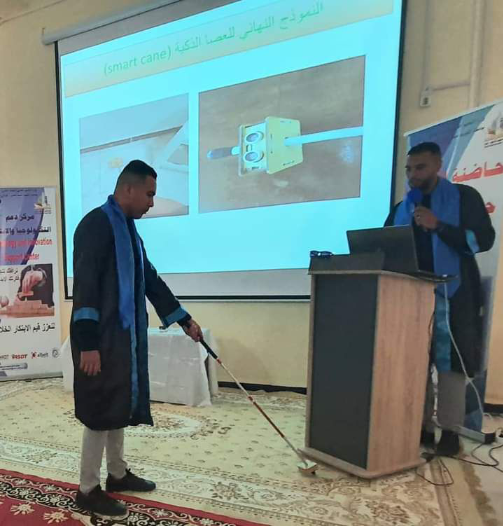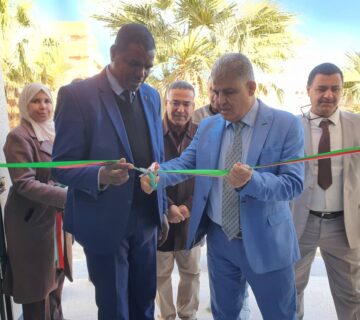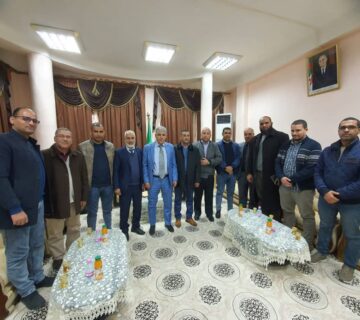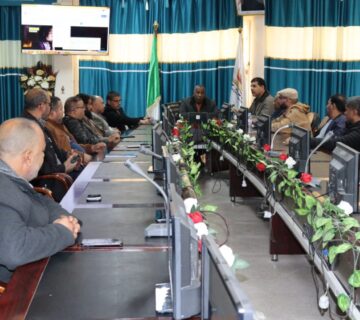L'Université d'El Oued dévoile d'autres innovations étudiantes : une canne intelligente, des lunettes parlantes pour les aveugles et une application de livraison de marchandises
On June 6, 2023, students Khiari Ahmed Khiari and Mahmoud Aiba from the Faculty of Technology at the University of Shahid Hamma Lakhdar presented their Master’s degree graduation thesis within the framework of the Start-up-Patent Institution in accordance with Ministerial Decision 1275. The thesis focused on three inventions developed by the students:
- A goods delivery application that received the trademark “Label” for student Khiari Ahmed Khiari.
- An innovative project consisting of two smart devices developed by the aforementioned student and student Mahmoud Aiba: a smart cane and talking glasses for the visually impaired.
The discussion session was attended by the University President, Professor Omar Ferhat, the Vice-President for External Relations, Professor Habib Qaddah, the Director of the Business Incubator, Mohamed Fouad Ferhat, and a number of professors, students, and their parents.
The discussion committee consisted of six members:
- Committee Chairman Dr. Shoaib Al-Abyad
- Examiners Dr. Mosbah Al-Awamer and Dr. Mansouri Khaled, representing the incubator
- Thesis supervisor Dr. حکیمة Sharif and her assistant Dr. Allali Nasiba
- Economic partner representing the Directorate of Solidarity and Social Activity
Before the discussion session, the University President gave a speech in which he praised the students’ achievements and their research projects, which he said had been transformed into patents that benefit society. He mentioned the “Safir” application for goods delivery, as well as the smart cane and talking glasses for the visually impaired. He also looked forward to discussing other important innovative projects in the coming days.
The University President also commended the work of the committee supervising the evaluation of the students’ research project, as well as the important role played by the Director of the Incubator in supporting and accompanying the Start-up-Patent projects within the framework of the strategy of the Ministry of Higher Education and Scientific Research. He pledged to provide all material, moral, and pedagogical support to help students achieve their goals and transform the university into a contributor to economic and social development by solving many of the problems posed through these innovative projects.
Dr. حکیمة Sharif, the supervisor of the students’ graduation thesis, which received an excellent grade, explained that the first invention by student Khiari Ahmed Khiari is the “Safir” application. The application is downloadable via the internet and allows customers to easily transport their goods from anywhere. The application connects the person who wants to transport their goods with a driver. The customer can request the chosen means of transport in a few minutes and contact the driver with their location, destination, type of load, weight, distance, and delivery time. They can also choose the appropriate price.
The customer first creates a free account and registers their personal information (name, surname, number, email address, and password), which is kept confidential in the application. When they log in to the application, they choose the desired vehicle, type of goods, and area. This information is sent to the driver, who reviews the request and sends the customer a price quote for the type of load. The customer can then approve the quote and the goods are transported to the specified location.
Dr. Sharif also noted that the inventor has received investment offers from economic operators in Oran, the capital, and the Sultanate of Oman.
The second and third inventions are joint projects between student Khiari Ahmed Khiari and student Mahmoud Aiba. They are two intelligent systems for the visually impaired:
- A smart cane with an ultrasonic sensor that can detect obstacles and send warning signals to the blind person through sound and ringing.
- Smart glasses equipped with an artificial intelligence camera. The camera captures images of obstacles and then identifies them using a pre-trained artificial intelligence algorithm. The name of the obstacle is then converted into sound that the blind person can hear through a headset connected to the glasses.
On the sidelines of the discussion session, the incubator organized a technology exhibition showcasing the most important innovations developed by students within the framework of the innovative projects. The exhibition was attended by the University President, the Vice-President for External Relations, members of the discussion committee, professors, students, and their parents. They were all impressed by the innovations developed by the students of the University of El Oued.




